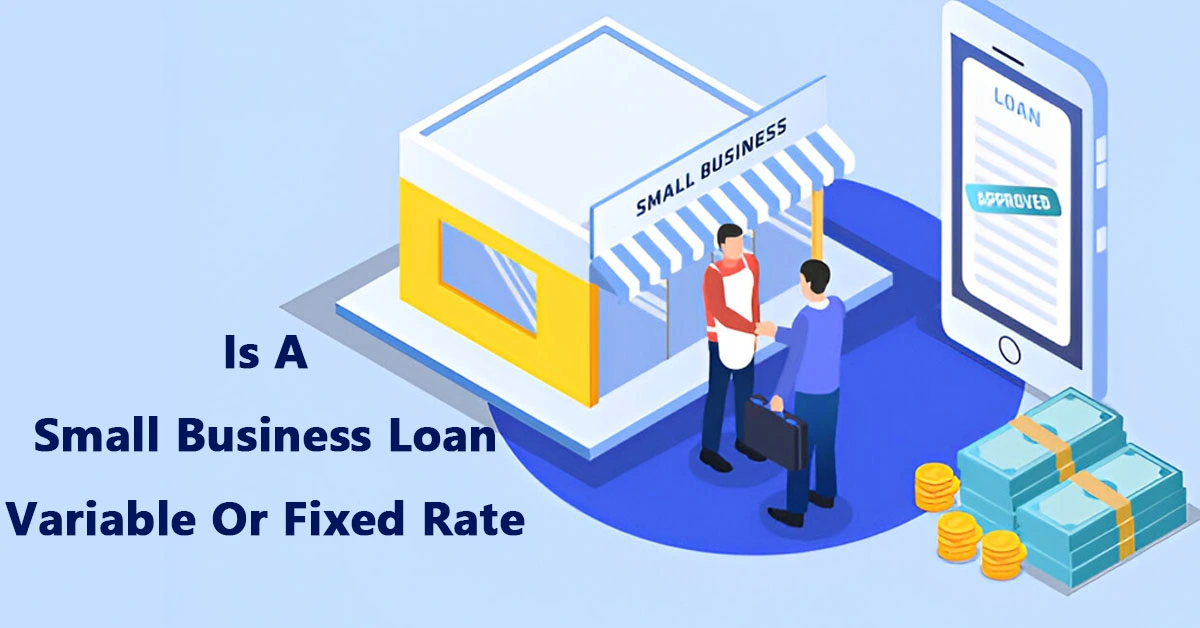Have you always wondered about the interest rates for small business loans? Well, you’re in luck! This article explores the key differences between variable and fixed interest rates for small business loans. Whether you’re a seasoned entrepreneur or just starting out, understanding these terms is crucial for making informed financial decisions. So, let’s dive in and shed some light on the fascinating world of small business loan interest rates!
What is a small business loan?
Definition
A small business loan refers to a financial offering provided to entrepreneurs and small business owners to fund their business activities. These loans are specifically designed to meet the unique needs of small businesses, ranging from start-ups to established enterprises. Small business loans are crucial in providing the necessary capital for businesses to expand, purchase equipment, hire employees, or manage day-to-day operations.
Purpose
The primary purpose of small business loans is to provide entrepreneurs with the financial resources they need to achieve their business goals. Whether it’s expanding operations, investing in new technology, or managing cash flow, small business loans offer an opportunity for business owners to secure the necessary funding. This financial assistance can help businesses thrive, create job opportunities, and contribute to economic growth.
Types of small business loans
There are various types of small business loans available to meet the unique needs and circumstances of entrepreneurs. Some common types include:
- Term loans: These loans are provided for a specific amount and need to be repaid over a fixed term. They are ideal for long-term investments or larger expenses.
- Lines of credit: A line of credit provides businesses with access to a pool of funds that can be used as needed. Business owners can withdraw funds up to a predetermined credit limit and only pay interest on the amount utilized.
- Equipment loans: These loans are specifically designed to finance the purchase or lease of equipment or machinery needed to operate the business.
- Small Business Administration (SBA) loans: SBA loans are guaranteed by the Small Business Administration, providing advantages such as lower down payments and longer repayment terms.
- Invoice financing: This type of loan allows businesses to receive immediate cash by selling their unpaid invoices to a lender at a discount.
- Commercial real estate loans: These loans are used to finance the purchase, renovation, or development of commercial properties.
Understanding the different types of small business loans can help entrepreneurs choose the most suitable option for their specific needs and circumstances.
Understanding Variable Interest Rate
Definition
A variable interest rate is a type of loan interest rate that can fluctuate over time. It is usually tied to a benchmark interest rate, such as the prime rate or the London Interbank Offered Rate (LIBOR). As these benchmark rates change, the interest rate on the loan also changes, resulting in varying monthly payments.
How it works
When you opt for a variable interest rate small business loan, the initial interest rate is typically lower than that of a fixed-rate loan. However, this rate is not guaranteed to remain the same throughout the loan term. The rate can increase or decrease depending on market conditions and the movement of the benchmark rate to which it is tied. This means that your monthly payments may increase or decrease over time, depending on the fluctuation of the interest rate.
Advantages
- Lower initial rates: One of the main advantages of variable interest rate loans is that they usually come with lower initial rates compared to fixed-rate loans. This can provide immediate cost savings and make it more affordable to borrow funds for your business.
- Potential savings: If the benchmark interest rate decreases over time, you may benefit from lower monthly payments and overall interest costs. This flexibility allows you to take advantage of favorable market conditions.
- Early repayment benefits: Variable rate loans often come with fewer penalties or fees for early repayment, providing you with the flexibility to pay off the loan sooner if your business cash flow allows.

Disadvantages
- Uncertainty: The main drawback of variable interest rate loans is the uncertainty of future interest rate movements. It can be challenging to predict how interest rates will change, which makes budgeting and financial planning more complex.
- Increasing payments: If the benchmark rate increases, your monthly payments may also increase. This can put pressure on your business cash flow and potentially affect profitability.
- Risk of interest rate hikes: While variable rates can provide savings during periods of decreasing interest rates, they also come with the risk of rates increasing significantly. This can lead to higher borrowing costs and greater financial strain on your business.
Understanding Fixed Interest Rate
Definition
A fixed interest rate is a type of loan interest rate that remains consistent throughout the loan term. It does not fluctuate with changes in the benchmark interest rate or market conditions. When you opt for a fixed interest rate small business loan, your monthly payments and the total interest cost will remain the same over the life of the loan.
How it works
With a fixed interest rate loan, the interest rate you initially agree upon will remain unchanged throughout the loan term. This provides stability and predictability in terms of your monthly repayment amounts. Regardless of any changes in market conditions or benchmark interest rates, your loan payments will remain constant.
Advantages
- Stability and predictability: Fixed interest rate loans offer stability and predictability, making it easier to budget and plan for your business finances. You can confidently know your monthly payment amount, allowing for better financial management.
- Protection against rising interest rates: By selecting a fixed interest rate, you are shielded from potential increases in the market interest rates. This protects your business from the risk of higher loan payments and gives you peace of mind in planning for the future.
- Easier financial planning: Fixed interest rate loans simplify financial planning as you can accurately forecast your business’s long-term financial commitments. This allows for better decision-making and helps ensure the continued growth and stability of your business.
Disadvantages
- Higher initial rates: Fixed interest rate loans typically come with higher initial rates compared to variable rate loans. This can result in higher borrowing costs and potentially make it more expensive to secure the necessary funds for your business.
- Missed savings opportunities: If the benchmark interest rates decrease over the loan term, you may miss out on potential savings compared to variable rate loans. The fixed rate means that your interest payments will remain the same, even if market conditions favor lower interest rates.
- Penalties for early repayment: Fixed rate loans may include penalties or fees for early repayment. This can limit your flexibility to pay off the loan sooner or refinance if you secure more favorable terms in the future.
Pros and Cons of Variable Rate Small Business Loans
Advantages
- Lower initial rates: Variable rate loans often have lower initial interest rates compared to fixed-rate loans, making them more affordable in the short term.
- Potential savings: If interest rates decrease, you can benefit from lower monthly payments and overall interest costs, providing potential savings for your business.
- Flexibility: Variable rate loans may provide flexibility in terms of early repayment options and fewer penalties for paying off the loan sooner.
Disadvantages
- Uncertainty: The unpredictable nature of variable interest rates can make budgeting and financial planning more challenging due to the uncertainty of future rate movements.
- Increasing payments: If interest rates rise, your monthly payments will also increase, potentially putting strain on your business cash flow.
- Risk of higher borrowing costs: There is always the risk that interest rates will increase significantly, leading to higher borrowing costs and potentially impacting your business’s profitability.
Factors to consider
When deciding whether a variable rate small business loan is the right choice for your business, consider the following factors:
- Business stability: If your business relies on consistent cash flow and requires predictability for financial planning, a fixed rate loan may be more suitable.
- Risk tolerance: Assess your risk tolerance and ability to manage potential interest rate fluctuations. If you are comfortable with taking on some level of risk, a variable rate loan may be a viable option.
- Market conditions: Consider the current and projected market conditions, including the direction of benchmark interest rates, to gauge the potential impact on your loan payments.
When it is a good option
A variable rate small business loan may be a good option when:
- You expect interest rates to remain stable or decrease in the near term.
- You have a high risk tolerance and can handle potential fluctuations in your loan payments.
- The initial lower interest rate will significantly benefit your business’s financial position.
Pros and Cons of Fixed Rate Small Business Loans
Advantages
- Stability and predictability: Fixed rate loans provide stability and predictability, making it easier to budget and plan for your business’s financial commitments.
- Protection against rising interest rates: By choosing a fixed rate, you protect your business from the risk of increasing interest rates, allowing for better long-term financial planning.
- Easier financial management: Fixed rate loans simplify financial management as you can accurately forecast your long-term repayment obligations and make informed business decisions.
Disadvantages
- Higher initial rates: Fixed rate loans typically have higher initial interest rates compared to variable rate loans, potentially resulting in higher overall borrowing costs.
- Missed savings opportunities: If benchmark interest rates decrease over time, you may miss out on potential savings compared to variable rate loans.
- Lack of flexibility: Fixed rate loans may come with penalties or fees for early repayment, limiting your ability to pay off the loan sooner or secure more favorable terms.
Factors to consider
When considering a fixed rate small business loan, take the following factors into account:
- Cash flow stability: If your business requires consistent and predictable monthly payments for effective cash flow management, a fixed rate loan may be the better choice.
- Risk aversion: If you have a low risk tolerance and want to minimize uncertainty in terms of loan interest rates, a fixed rate loan offers more stability.
- Long-term planning: If your business operates on long-term planning cycles, having a fixed rate loan simplifies financial projections and helps with strategic decision-making.
When it is a good option
A fixed rate small business loan may be a good option when:
- Interest rates are currently low, and you want to lock in a favorable rate for the entire loan term.
- Your business requires steady cash flow management and stability in financial planning.
- You have a low risk tolerance and want to minimize exposure to potential interest rate hikes.
Factors Influencing the Choice Between Variable and Fixed Rates
Loan Amount
The loan amount can influence the choice between variable and fixed rates. If you are seeking a significant loan amount, a fixed rate loan may provide more stability and predictability for your long-term financial planning.
Loan Duration
The duration of the loan can also impact your decision. If you opt for a short-term loan, a variable rate may be more suitable as the interest rate fluctuations may have a minimal impact. However, for longer-term loans, a fixed rate can help mitigate the risks associated with potential interest rate fluctuations.
Interest Rate Market
The overall interest rate market conditions play a significant role in the choice between variable and fixed rates. If economic indicators suggest a downward trend in interest rates, a variable rate loan may provide an opportunity for savings. Conversely, if there are indications of rising interest rates, a fixed rate loan may offer more security.
Business Risk
Assessing the overall risk profile of your business is crucial in determining the interest rate type. If your business operates in an industry prone to volatility or has erratic cash flow, a fixed rate loan can provide stability and help manage potential risks associated with interest rate fluctuations.
Economic Conditions
The prevailing economic conditions, such as inflation rates and monetary policy decisions, can impact interest rates. Consider the current economic landscape and how it may influence interest rates when deciding between variable and fixed rates.
Factors to Consider When Deciding on Interest Rate Type
Risk Tolerance
Your risk tolerance will influence your decision on the interest rate type. If you are comfortable with potential fluctuations in your loan payments, a variable rate may be suitable. Conversely, if you have a low risk tolerance, a fixed rate will offer more stability.
Cash Flow
Assess your business’s cash flow situation and how it may be affected by changes in loan payments. A variable rate loan can provide lower initial payments but may be subject to fluctuations, while a fixed rate loan offers predictability at the cost of potentially higher initial payments.
Market Conditions
Stay informed about the current and projected market conditions, including interest rate trends, inflation rates, and economic forecasts. This information will help you make an informed decision regarding the interest rate type that aligns with your business goals.
Business Plans
Consider your future business plans and growth trajectory. If you have expansion plans or anticipate significant changes in your business, the interest rate type you choose can impact your ability to manage cash flow and make financial decisions.
Loan Purpose
The purpose of the loan can also influence the interest rate type. For example, if you are investing in long-term assets or real estate, a fixed rate can provide stability in your loan payments. On the other hand, if you need short-term working capital, a variable rate may offer more flexibility.
Getting a Small Business Loan: Tips and Advice
Seeking Professional Advice
Before applying for a small business loan, it is advisable to seek professional advice from a financial advisor or a small business loan specialist. They can provide guidance tailored to your specific circumstances, help you understand the options available, and assist with choosing the most suitable loan type and lender.
Comparing Lenders
To ensure you secure the best possible loan terms, it is essential to compare lenders. Research and evaluate multiple lenders, considering factors such as interest rates, loan terms, and associated fees. This will help you find the lender that offers the most favorable terms for your business.
Reading Loan Terms
Carefully read and understand all loan terms and conditions before signing any agreements. Pay attention to details such as interest rates, repayment schedules, penalties, fees, and any other relevant clauses. Clarify any questions or concerns you may have with the lender before committing to the loan.
Negotiating
Negotiating the loan terms can be beneficial in securing more favorable terms. Consider negotiating the interest rate, repayment period, and any additional fees or requirements. Present a strong case for why your business is a good lending risk and how the loan will contribute to your growth and success.
Considering Future Needs
When selecting a small business loan, consider your future needs beyond the immediate financing requirements. Think about how the loan will impact your long-term plans and growth objectives. Anticipating future needs can help you choose a loan that offers flexibility and accommodates your changing business requirements.
Conclusion
In conclusion, choosing between a variable or fixed interest rate for a small business loan requires careful consideration of various factors. Both options have their advantages and disadvantages, and the decision should align with your business goals and risk tolerance. Understanding the nuances of each interest rate type, evaluating market conditions, and seeking professional advice will help you make an informed decision. Remember, a small business loan is a valuable tool that can provide the necessary capital to fuel your business’s growth and success.

Hi there! I’m paydayfxloan, an author and the driving force behind PayDayFxLoan. I am passionate about empowering individuals on their financial journey, and that’s exactly what this website is all about. With a focus on loan insights, I provide comprehensive guides and resources that will help you navigate the loan landscape with confidence. Whether you’re looking to understand different loan types or seeking advice on managing repayments, I’m here to equip you with the knowledge you need for a secure financial future. Come join me as we explore the world of loans and empower ourselves to make informed financial decisions.

